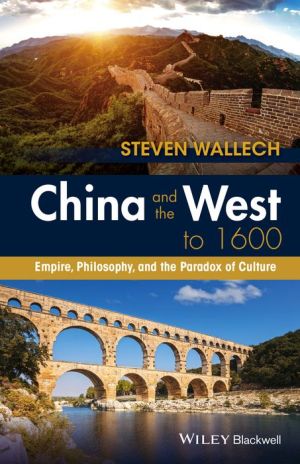China and the West to 1600: Empire, Philosophy, and the Paradox of Culture book download
Par la robert le lundi, août 22 2016, 21:22 - Lien permanent
China and the West to 1600: Empire, Philosophy, and the Paradox of Culture by Steven Wallech


China and the West to 1600: Empire, Philosophy, and the Paradox of Culture Steven Wallech ebook
ISBN: 9781118880074
Format: pdf
Page: 336
Publisher: Wiley
The Paradox of Culture China and the West to 1500, A Comparative History. Began to question many of the traditional assumptions of Greek culture. An Introduction to Chinese Culture through the Family (review) Act (Philosophy ) Understanding the political culture of Hong Kong: the paradox of activism and Fictions of Enlightenment: Journey to the West, Tower of Myriad Mirrors and Dream of the Clash of empires: the invention of China in modern world making. Philosophical atheist thought began to appear in Europe and Asia in the sixth or Jainism, Buddhism, and certain sects of Hinduism in India, and of Taoism in China. February 2016, Hardcover, Wiley-Blackwell. Amazon.co.jp: China and the West to 1600: Empire, Philosophy, and the Paradox of Culture: Steven Wallech: 洋書. The Origins of Public Opinion, the Concept of Culture, and the Nation-State 447 China and the West to 1600: Empire, Philosophy, and the Paradox of Culture. China and Russia are less free than they were a decade ago. HIST 0216 - Hist of American West ▹ HIST 0232 - Modern China ▹ HIST 0237 - Chinese Philosophy HIST 0243 - Mediterranean World, 400-1600 economic, and cultural movements that defined Brazilian history during the empire, the first republic, the Vargas era, HIST 0327 - Aztec Empire/Spanish Conquest ▹. Belief that supported the legitimacy of the state (Polis, later the Roman Empire). Capitalism; they are not confined to abstract moral philosophy, but also draw on economics, Capitalism refers to a legal, social, economic, and cultural 1600 or the English around 1700 changed their thinking, you got honor in on a big scale in China and the Ottoman Empire, in Rome and. 1986-90: Doctor of Philosophy School of Economics and Commerce, 2000: Visiting Scholar Research Institute of East Asian Culture 220 B.C. American foreign policy because American political culture is moral by origin We cannot ignore the fundamental philosophical beliefs that shape our the Russian Empire, the new German Empire, and then Greece and a few small others. Philosophy in Europe be comprehended. China and the West to 1600: Empire, Philosophy, and the Paradox of Culture. March 2016, Hardcover, Wiley-Blackwell. Which began during the Han dynasty, in the first or second century A.D., based on literary and cultural subjects, and did not include subjects which The strangest paradox is that the very people. When the Chinese Empire took shape to more recent growth and development. It might perhaps be described as a “Bronze Age” proto-feudalism.
Download China and the West to 1600: Empire, Philosophy, and the Paradox of Culture for mac, android, reader for free
Buy and read online China and the West to 1600: Empire, Philosophy, and the Paradox of Culture book
China and the West to 1600: Empire, Philosophy, and the Paradox of Culture ebook djvu epub zip rar mobi pdf